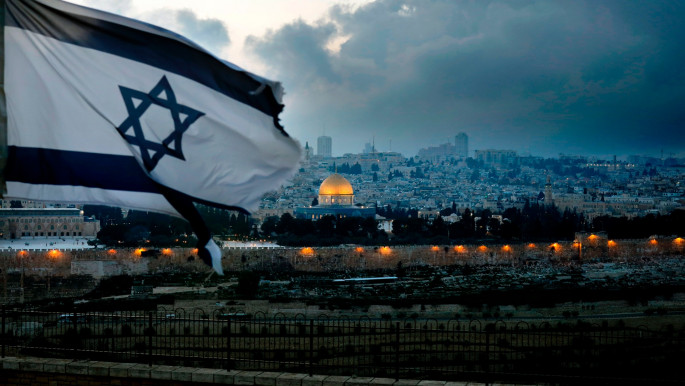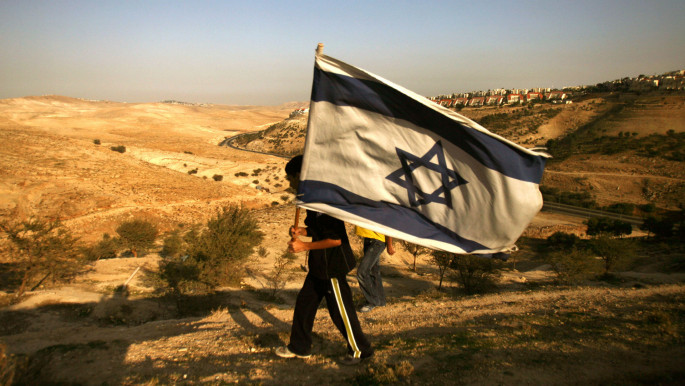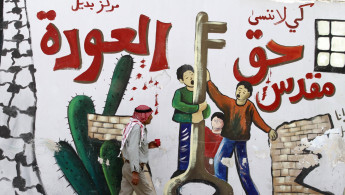Remembering 72 years of the Nakba in the shadow of annexation
They are also marking a continued Nakba (al-Nakba al-Mustimirrah in Arabic) - an ongoing process of erasure and ethnic cleansing which has seen Palestinians ghettoised, fragmented, killed and more.
This year we will be marking 72 years of the Nakba and yet one word seems to be taking front and centre stage: annexation. Ever since the announcement of US President Donald Trump's 'Deal of the Century' at the end of January this year, formal annexation of the occupied West Bank by Israel has been looming.
Indeed, it is rumoured that US Secretary of State Mike Pompeo's visit to Netanyahu on Wednesday was to give the green light for the annexation of the Jordan Valley.
The term 'annexation' in its legal meaning refers to when following the forced acquisition of territory by an occupying regime, said occupier applies its sovereignty over the occupied territory.
The act is illegal under international law and has been reaffirmed by the UN Security Council as such in the case of Israel's occupation of the West Bank, Gaza and Syrian Golan Heights many times.
 |
When Palestinians commemorate the Nakba they are not simply remembering a past event in which over 750,000 Palestinians were expelled from their homeland |  |
It's pertinent also to describe what annexation means in non-legal terms and its actual manifestations on the ground; the theft of land, total control over it and the resources, and usually the displacement of large swathes of the indigenous population.
In Palestine, this initially happened in 1948 with the foundation of the settler colonial State of Israel, and later with the occupation of the 1967 territories and their de facto annexation.
 |
|
| Read more: The day after annexation: Israel, Palestine and the one-state reality |
International law deemed this later occupation and annexation as illegal, and for the last 53 years there have been lukewarm condemnations by the international community.
All the while, Israel has solidified the occupation and continued with attempts to make it irreversible through the "illegal" settlement enterprise, which was launched by an Israeli Labour Government.
This last point is an important one - settlement building is not just a policy of the right-wing in Israel, as some liberals in the US and elsewhere may like to believe.
It is a cross partisan policy and one that enjoys wide support in Israeli society, as demonstrated by the fact that both Likud and the opposition coalition 'Blue and White' fought over who would deliver formal annexation throughout this year's election period.
Palestinians and their leadership have very little influence over whether or not this de jure annexation will happen, and it seems in actual fact that the decision will be made in Washington DC.
 |
Formal annexation will mean the acceleration of a process that has been underway for the last 72 years - the continuous Nakba |  |
While the ramifications of official annexation will be serious, indeed it will mean immediate and mass confiscation of Palestinian land, it is important to put it within the context of a process that has already been underway for the last 72 years - the continuous Nakba. Formal annexation will simply mean an acceleration of that process.
This is not a defeatist attitude, but rather one that acknowledges the reality of de facto annexation - one that seems to invoke very little tangible reaction from the international community. This is why official annexation of the West Bank or parts of it might actually be a game changer.
 |
|
| Read more: Interactive timeline: The history of Israeli settlements since 1967 |
It would no longer allow third parties to maintain that the occupation is temporary or that the theft of Palestinian land is a red line. This in turn places the validity of the international legal regime front and centre.
For Palestinians, the commemoration of 72 years of the Nakba is both poignant and empowering. Poignant because we remember how our society was shattered in 1948, how our people continue to be dispersed, imprisoned and killed and how our lands are being increasingly taken from us.
Yet it's empowering because we survived ethnic cleansing, and, despite the exile of half of our people, we still have a presence on the land.
Israel formally annexing yet more Palestinian land doesn't change any of this, it simply confirms what Palestinians have been saying since 1948.
Follow her on Twitter: @yarahawari



